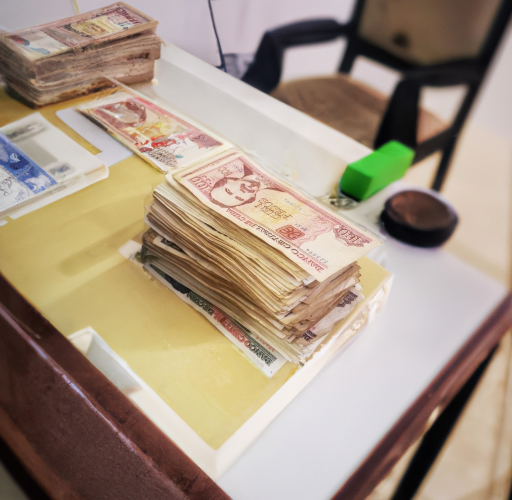Exchange Money With Care: Scams To Watch Out For
October 11, 2023

The appeal of travel lies not only in discovering new landscapes, but also in immersing oneself in different cultures, cuisines and customs. To be sure, digital payments are possible in more and more places. However, in many countries and places it is still necessary to carry cash with you. Because to really immerse yourself in the country, you still can’t get around using the local currency. This allows travelers to have the most authentic experiences – from bustling bazaars to quaint cafes and hidden restaurants. But as travelers eagerly dive into the world of foreign money, they often overlook the potential pitfalls lurking in the depths.
Currency exchange, while seemingly simple, can be a minefield of deception and scams. In the excitement of traveling to unfamiliar climes, many are susceptible to sophisticated schemes designed to take advantage of a lack of financial knowledge on the ground. Whether it’s the glitzy exchange counters at international airports or the seemingly friendly locals who want to give you a “special rate,” the world of currency exchange is full of pitfalls. This article aims to educate you about these hidden pitfalls and ensure that your travel memories are filled with wonderful experiences, not stories about money worries.
The Allure of Foreign Currency
Currency, in its many forms and designs, tells of a country’s history, culture and values. For travelers, a foreign currency is something like a piece of the country’s identity. Besides the tangible thrill of colorful bills and complicated coins, there is also a practical side. Even in our digital age, where credit cards and mobile payments have revolutionized payments, local currency is still key to real experiences off the tourist trail in many destinations.
Think street markets in Bangkok, roadside restaurants in Marrakech, rickshaw rides in Delhi, or a country like Cuba where payment can be made almost exclusively in local currency. These authentic experiences often require cash, making currency exchange an unavoidable part of travel. But as the demand for local currency increases, so does the possibility of exploitation. Unscrupulous individuals and businesses take advantage of travelers’ ignorance of exchange rates, local customs, or even the look and feel of the currency itself.
In addition, the urgency to exchange money, especially upon arrival in a new country, can sometimes overshadow the need for caution. In those hurried moments, amid the excitement and fatigue of travel, many fall for scammers. Who doesn’t know it… We just arrive at our destination airport from a long flight and no sooner do we arrive than we are ambushed by a horde of local people who want to make a quick buck.
As we delve into the intricacies of currency exchange, we should remember that knowledge is our best defense to ensure our adventures are one of exploration and not exploitation.
Common Currency Exchange Scams
Navigating the vibrant streets of a foreign city, every traveler is armed with a sense of adventure and, often, a wallet filled with local currency. But just as these streets can lead to hidden gems and unforgettable experiences, they can also hide pitfalls for the unsuspecting tourist. Let’s uncover some of the most common currency exchange scams that have ensnared many a traveler:
The Bait-and-Switch Rate
Picture this: A board in front of an exchange office advertises an incredibly low rate. Excited, you enter, only to receive a much lower amount than you expected. The catch? The advertised rate only applies to large bills or transactions over a certain amount – a detail hidden in the fine print.
Short-Changing
It’s a simple but effective trick. You hand over a large bill, but the change you receive is based on a smaller denomination. In the hustle and bustle, and especially with an unfamiliar currency, it’s easy to miss.
Counterfeit Currency
In your hands you hold crisp bills that you just changed. But on closer inspection, or when you try to use them, you find they are counterfeit. Some unscrupulous dealers take advantage of tourists’ ignorance of the look and feel of the local currency. This is mostly common when you change local currency to USD or EUR. Many counterfeiters don’t bother with counterfeiting in local currency because it often has very little value. You should still have a sense of what the local currency looks like.
The Commission Confusion
“No commission!” screams a sign, luring travelers with the promise of straightforward transactions. But even if there is no direct commission, the exchange rate offered is often far from the market rate, so the merchant still makes a hefty profit.
Dynamic Currency Conversion Scams
When withdrawing from a foreign ATM or paying at a terminal, you’re sometimes offered the “convenience” of seeing the amount in your home currency and that the atm will charge you in your local currency. While it might seem helpful, this dynamic currency conversion comes with inflated exchange rates and additional fees. Just never accept the rate. You find a comprehensive article about this common scam in the article Why you should really never accept the suggested exchange rate at the atm.
Awareness of these scams is the first step in safeguarding oneself. As the saying goes, forewarned is forearmed. As we journey through foreign lands, it’s essential to be vigilant, ensuring our travel tales are of exploration and wonder, not of being outwitted.
Safe Havens for Currency Exchange
While the world of foreign currency exchange can seem like a treacherous terrain, there are indeed safe paths to tread. Knowing where to exchange your money can make all the difference between a smooth transaction and a costly mistake. Here’s a guide to some of the safer options for travelers:
Banks
Banks are one of the most reliable places to exchange money and offer the security of established institutions. Their rates may not always be the best, but they are usually competitive and transparent. In addition, the risk of receiving counterfeit money is almost eliminated.
ATMs
For modern travelers, ATMs are often the best choice if you don’t have cash on you to exchange. They offer the convenience of round-the-clock service and rates that are usually based on interbank exchange rates, which tend to be very fair. However, watch out for fees charged by both the local bank and your home institution. Also, always opt for settlement in local currency to avoid the pitfalls of dynamic currency conversion. Also, make sure that the ATM is not tampered with. You can find out more about this in the article ATM Scams: What Everyone Should Know and how to dodge them.
Airport Exchange Counters
At first glance, the convenience of airport counters is undeniable, especially after a long flight. While they are usually trustworthy, their prices can be less favorable due to the captive audience they cater to. I advise most who want to exchange money at the airport to only change a small amount to cover immediate expenses, and then look elsewhere for better rates.
Local Authorized Dealers
Often, local currency exchange offices, especially in touristy areas, offer favorable rates. Look for licensed exchange bureaus or those that are clearly affiliated with reputable institutions. Reading reviews or recommendations from fellow travelers can also point you in the direction of trustworthy merchants. Most of the time I make good experiences by looking at the ratings and reviews of the exchange offices from Google Maps.
While these options represent safer harbors in the vast sea of currency exchange, the key is always diligence. Double-checking rates, counting your money before leaving the counter, and being aware of the current market rate can ensure that your financial transactions remain just a footnote in your grand travel adventure, not a cautionary tale.
Special case when visiting countries with high inflation
Cuba I would like to show here separately as a special case, because it is important in Cuba to take cash with you (as of October 2023) for your entire time of travel. However, you must not exchange this cash at the official banks or exchange offices, because you get a much lower exchange rate than if you exchange it with the local people. If you skim money from an ATM with your credit card you will also get a very poor exchange rate. It is easy to exchange money in Cuba with the locals, as everyone in Cuba is happy to have foreign money, as the local money has an enormously high inflation. The current rates at which you can exchange in Cuba can be found here. Often you will get 10 times as much money as if you would exchange it at a bank. Remember to take USD or Euro cash with you and exchange it into the local currency CUP (Cuban Peso).
In Argentina there has been a time when it was similar in the past years. If you’re visiting a country known for high inflation, check out travel blogs for the latest information. At the end of the article, I list some sources.
Red Flags to Watch Out For
As travelers, our senses are often heightened, taking in new sights, sounds, and experiences. But when it comes to currency exchange, there are certain warning signs that we must train ourselves to detect. These red flags can be the difference between a seamless transaction and a regrettable misstep. Here’s what to keep an eye out for:
Too Good to Be True Rates
If an exchange rate seems significantly better than competitors or the general market rate, proceed with caution. Such rates are often bait to lure unsuspecting travelers into other hidden fees or scams.
High-Pressure Tactics
Be wary of dealers who rush you into making an exchange or use high-pressure sales tactics. A legitimate business will give you the time and space to make an informed decision.
Lack of Transparency
If the dealer is hesitant to provide clear information about fees, commissions, or the total amount you’ll receive, it’s a clear warning sign.
Unofficial Exchangers
While it might be tempting to exchange money with someone offering a “special deal” on the street or outside tourist spots, these are often fronts for scams or counterfeit currency distribution.
Incorrect display of exchange rates
If the displayed rates for buying and selling a currency are very close, it might be a tactic to confuse or mislead. The buy and sell rates should have a noticeable difference based on the market spread. Always ask what amount you get and calculate it yourself too.
No Receipt Policy
Always ask for a receipt after your transaction. If the dealer is reluctant or outright refuses, it could indicate shady practices.
Isolated or Hidden Locations
Exchange booths or ATMs located in isolated or hidden corners might be more prone to scams or tampering. Stick to well-lit, busy areas.
Knowing these warning signs will help you navigate the currency exchange maze. Remember, when in doubt, trust your instincts. If something seems strange or too risky, it’s always better to leave it alone and look for a more reliable alternative. It’s also best to ask your hostel or hotel which exchange office they can recommend. Safe travel also means safe transactions.
Additional Resources for Travelers
The modern traveler has a plethora of tools and resources at their disposal to ensure their journey is smooth and informed, especially when it comes to financial transactions. Here are some recommended tools and platforms to help navigate the world of currency exchange:
Currency Conversion Apps
Easy Currency Converter: My favorite app. Allows accurate quotes, adding favorite currencies, is available offline and free.
XE Currency: Renowned for its accuracy, has the most downloads, this app provides live exchange rates and even works offline by saving the last updated rates.
OANDA: Also a favorite among travelers, it offers a simple interface and a currency converter based on daily filter rates.
Travel Forums
TripAdvisor: Beyond hotel and restaurant reviews, this platform has an active forum where travelers share their experiences, including those related to currency exchange.
Lonely Planet’s Facebook-Group: Until Covid happened, there was the lonely planet Thorn Tree Forum. But it was closed in 2021. Now you can use the Facebook group instead.
Reddit: Also very popular with questions about travel and all other kind. Has a large community and you often get answers very quickly.
Local Embassy or Consulate Websites
Some embassies provide travel advisories for their citizens, including information on currency-related scams prevalent in the area. I like the websites of the foreign office of Germany and the department of State from the USA very much. It’s easy to translate and up to date.
The Final thoughts on Currency Conversion
The thrill of travel is often associated with the joy of discovery, setting out into the unknown and making memories that last a lifetime. But as enriching as travel is, it also brings some challenges. One of these is the complicated dance of exchanging money, where the excitement of holding a foreign bill in hand is sometimes overshadowed by the lurking shadows of fraud and deception.
But as with many aspects of travel, knowledge and preparation are the compasses that guide us safely. By knowing the potential pitfalls in the world of foreign currencies and being vigilant, you can ensure that your financial transactions don’t become an unwelcome detour, but instead fit seamlessly into your adventure.
In the vast tapestry of travel experiences, from the mesmerizing sunsets to the chance encounters, let’s make sure our stories of currency exchange are just a footnote, a mere transaction, and not a cautionary chapter. As we pack our bags, plan our itineraries, and set out on new adventures, let’s equip ourselves with the wisdom to navigate the difficult waters of foreign money with confidence and ease. Bon voyage and may your journey be as enriching as the stories you bring back!








